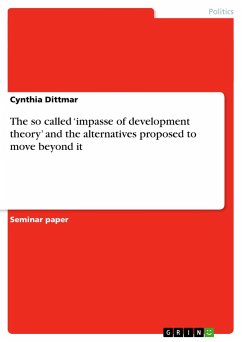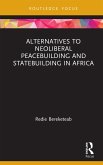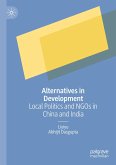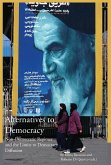Seminar paper from the year 2008 in the subject Politics - International Politics - Topic: Development Politics, grade: distinction, University of Manchester (Institute for Development Policy and Management), course: Perspectives on Development, language: English, abstract: In the mid 1980s development studies experienced a crisis, the often called impasse of de-velopment theory and policy (Schuurmann 1993). The reasons can be found on the level of development thinking and of "real-world changes and problems" (Simon 2003: 6). Devel-opment thinking got stuck in a cul-de-sac as both grand meta-narratives of development the-ory - Modernisation theory and radical Marxist approaches - lost their hegemony: radical alternative theories, based on Marxist and neo-Marxist political economy were discredited by the collapse of socialism. Modernisation theory, based in neoclassical economics did not seem to deliver many benefits as economic growth turned out to produce more ecological, socialand economical problems than it solved (ibid.). It became clear that growth and the neo-liberal agenda with its structural adjustment programs (SAP) in the 1980s and 1990s was not necessarily connected to other development goals like employment creation, reduc-tion of inequality and poverty or the provision of basic needs. The acceleration of globalisation and with it the questioning of the nation state as a "trusted point of reference" (Schuurman 2000: 7) of development studies intensified the crisis of de-velopment theory. Moreover new theoretical approaches like feminism, post modernism and post colonialism, and the growing recognition of heterogeneity of the third world, challenged development studies and theory even more (Schuurman 1993).There have been two major reactions to the impasse of development theory and policy. The first reaction was the search for development alternatives with the intention of reforming and redefining the goals of development. The second reaction, post development thinking, was more radical as it rejects development as a whole. However, development studies and practice survived the impasse and is back on the agenda: "a flourishing industry centred on social capital and social development has arisen in the World Bank, the UNDP and other multilateral institutions" (Hart 2001: 649). This paper aims to review alternative development (section 2) and post development (section 3), and analyses which contributions have helped to overcome the impasse.








